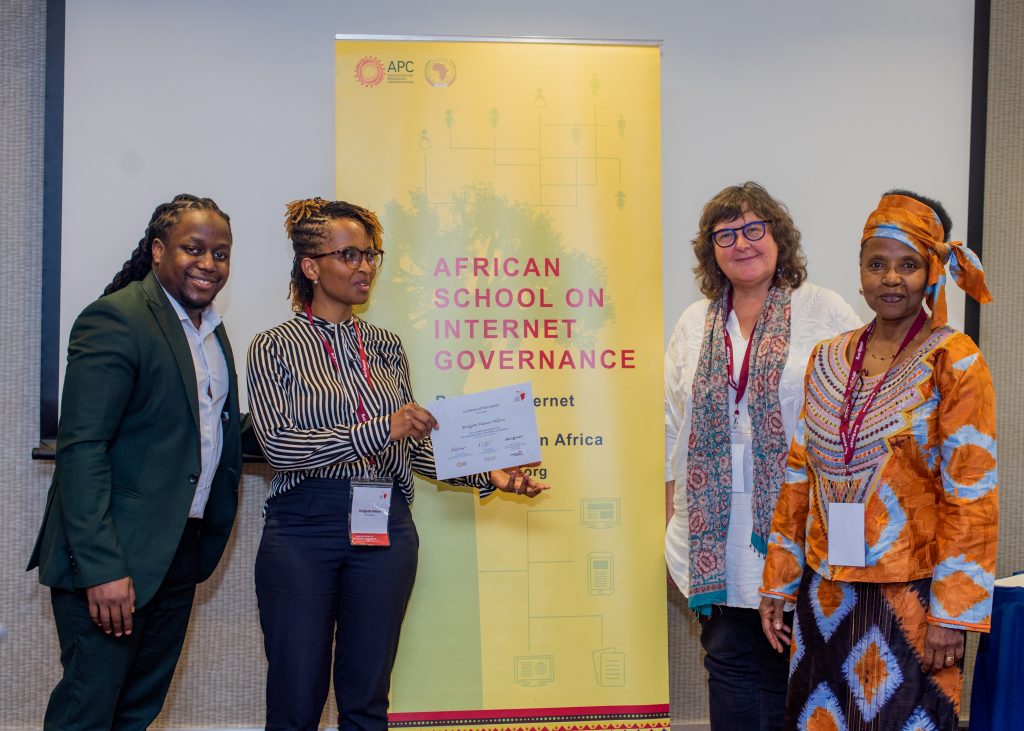
By Bridgette Hanani Ndlovu
On the evening of 15 September 2023, the meeting room at the Envoy Hotel on Diplomatic Drive in Abuja, Nigeria was filled with anticipation as the chairperson simulated United Nations negotiations, giving civil society, media, legislators and government representatives a glimpse and vivid picture of how African School on Internet Governance (AfriSIG) fellows can influence policies at regional and international platforms.
“Civil society, Ladies and Gentlemen, I call to order the African School on Internet Governance (AfriSIG) fellows to engage on implementing the African Union Data Policy Framework. My fellow co-chair and I would like to welcome all delegations. Delegations, you can raise your flag to speak. This document will remain in brackets until we have reached a consensus. We now come to the statements and I give the distinguished civil society representatives the floor. Subject matter experts, we are counting on you to assess the work of delegations.”
At that moment, I realised we were being groomed to take up space in international internet governance platforms. While AfriSIG 2023 was dedicated to building internet governance leaders in Africa, it provided an understanding of global negotiations and concessions on policy matters.
I attended the 11th edition of AfriSIG, which took place on 13-18 September 2023. Since 2012, the School has brought together at least 40 participants annually, within the digital rights ecosystem, to deliberate on internet policy, telecommunications policy, regulations policy issues and design strategies for internet governance in Africa through a collaborative multistakeholder approach. This year, the School’s theme was the African Union Data Policy Framework (AUDPF).
Implementing the framework is envisaged to save Africa from nagging internet governance challenges. In 2022, African member states adopted the AUDPF in Addis Ababa. The domestication of the AUDPF will promote Africa’s resilience and encourage young people’s active participation in the digital economy. The AUDPF represents a significant milestone in creating a united data environment and harmonised African digital data governance systems. It is envisaged that these steps will promote the free and secure flow of data across Africa, provide safeguards for human rights and uphold security.
As AfriSIG fellows, we prepared challenges, opportunities and recommendations to implement the AUDPF and got first-hand experience and support for responding to policy propositions and decisions. During the intense one-week residential interactive learning and knowledge-sharing school set in the federal capital of Abuja in Nigeria, I had the honour of sharing the room with cybersecurity experts such as Abdul Hakeem Ajijola, Sheetal Kumar and Folake Olagunju, data protection specialists such as Anriette Esterhuysen, Avani Singh and Hanani Hlomani, media and platform governance experts such as Edeatoan Ojo and Guy Berger, and internet experts such as Yaovi Atohoun and Victor Ndonnang. Information regulators such as Pansy Tlakula gave remarks during AfriSIG 2023. The School took place at an opportune time, setting the tone for the African Internet Governance Forum, which took place in Abuja immediately after.
The School focused on the following topics: digitalisation, sustainable development, the global internet governance ecosystem, open internet architecture, management of internet names and numbers, data governance, human rights and the internet, cybersecurity, artificial intelligence, climate change, digital sovereignty and the geopolitics of internet governance, WSIS +20, the Global Digital Compact and the Summit of the Future.
As a growing digital rights expert interested in seeing a rights-respecting internet and seeing governments and civil society organisations taking steps to ensure that the internet operates and evolves in ways that fulfil human rights, I intend to host meetings to raise awareness on digital rights topics such as data protection and cybersecurity. I intend to share information on the available data protection frameworks among the networks within my reach and use the skills learnt to review technology policies that emerge locally, regionally and globally.
It was fascinating to see how representatives from over 10 African countries came together, worked collaboratively in developing an implementation framework for the AUDPF, and lived harmoniously during AfriSIG 2023 despite language differences. The school provided translation services for non-English-speaking participants. When French-speaking participants engaged, we all picked up our translation devices to listen and engage. As a result, the conversation flowed seamlessly. My biggest takeaway from the school was how the cultural diversity among fellows cemented AfriSIG as a pan-African platform where fellows shared experiences from their home countries and designed solutions that would be integrated into the whole of Africa. The opportunity opened my mind to endless possibilities and cemented my interest in influencing policy at local, regional and international levels.
Bridgette has worked in the media sector and has experience spearheading successful online and offline campaigns on democracy and governance, citizen participation, and digital, economic and women and girls’ social rights. Bridgette is a member of the African Internet Rights Alliance. She is passionate about promoting human rights for all, particularly in Africa, and documenting the importance of digital spaces. She has experience leading communications projects, advancing women’s rights, organising pan-African events, strengthening the capacity of young people to actively participate in decision-making processes, and coordinating meaningful engagements with strategic stakeholders in various settings.
